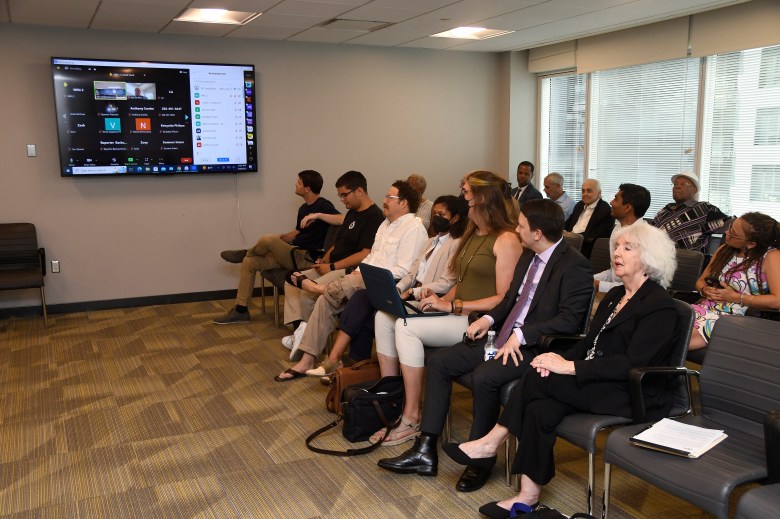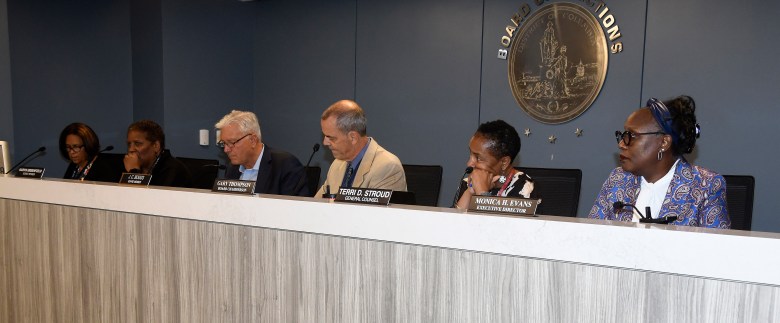After hours of public testimony and two days of backroom deliberations, the D.C. Board of Elections (DCBOE) designated a polarizing ballot initiative as “proper subject matter” and suitable for inclusion on the 2024 ballot.
The Make All Votes Count Act of 2024 sets out to implement ranked-choice voting and allow non-party affiliated voters to participate in primary elections for the party of their choice.
Ranked-choice voting (RCV) allows voters to rank candidates by level of preference. After each voter’s first choice is counted, the candidate with the least votes is eliminated. From that point, each ballot will count for whichever candidate they have ranked the highest until one candidate wins more than 50% of the total votes.
An open primary system would affect 86,000 voters who are currently unable to participate in party primaries for public office because of their independent status.
On July 18, proponents and opponents of the ballot initiative weighed in on its constitutionality and whether it would incur an additional cost. Arguments presented on both sides necessitated, as DCBOE chairman Gary Thompson told the Informer, more time needed for a discussion than what has been the case for other matters to go before DCBOE over the last 18 months.

Over the two days of deliberations, DCBOE received a bevy of additional written testimony from those on both sides of the issie. In the end, DCBOE voted unanimously in favor of the Make All Votes Act of 2024.
“I don’t find [ranked-choice voting] in violation of the Human Rights Act and U.S. Constitution. There has been case law that [says] RCV is not unconstitutional,” Thompson said on Friday. “The open primary part is one I struggled with ultimately [but] I found that it doesn’t run afoul of our D.C. charter. We have partisan elections in each party with a party nominee and one on one in the general ballot. It doesn’t violate the U.S. constitution for reasons that the Supreme Court pointed out. It’s something we can certify as proper subject matter to pass on to voters to decide.”
A significant issue brought up throughout the discussions concerned whether the ballot initiative would require an appropriation of funds. In statements submitted to DCBOE, the D.C. Council’s Office of General Counsel and the D.C. Office of the Attorney General (OAG) provided differing perspectives on that point, with OAG saying that BOE could add a clause preventing the appropriation of funds.
Another point brought up, as mentioned by Thompson, was appropriation being a matter for the D.C. Council to decide upon the ballot measure’s approval.
Now that the Make All Votes Count Act of 2024 has passed the “proper subject matter” threshold, the Office of the Chief Financial Officer has 15 days to provide DCBOE with an analysis. DCBOE also has 20 days to finalize the short title, summary text and legislative text of the Make All Votes Count Act of 2024, after which it will conduct a hearing to vote on the final version of the ballot initiative.
During another hearing later this year, Make All Votes Count DC members will be presented with circulating petitions for the ballot initiative. They will need to collect an amount of signatures equating to 5% of the local electorate to ensure that it appears on the 2024 ballot.

Days before DCBOE made its decision, Lisa D.T. Rice, a Ward 7 resident and non-party affiliated voter who submitted the Make All Votes Count Act of 2024, expressed confidence that the ballot initiative would withstand scrutiny. While testifying before DCBOE, she weighed in on the significance of RCV and open primaries, more so than whether the initiative met DCBOE’s criteria.
In her testimony, Rice said that ranked-choice voting holds elected officials better accountable to the masses of local voters. As it relates to open primaries, Rice noted that independent voters should be allowed to weigh in on tax-payer funded electoral exercises that determine the composition of local government.
“I shouldn’t have to subscribe to a party,” Rice said. “If each of the parties were funding their own primary, they could cut me out, but we should be able to vote in them. We want to hold politicians accountable.”
Others who testified in favor of the ballot measure on Tuesday included other Make All Votes Count DC coalition members along with ANC Commissioners Rev. Wendy Hamilton (8D06) and Peter Wood (1C03), the latter of whom cited Federalist Paper No. 39 to argue that power comes from the people. David Krucoff, a third-generation Washingtonian, said that current elected representation doesn’t represent the District’s political diversity.
Barbara Zia, president of League of Women Voters DC, and Victoria Pelletier of RepresentWomen later touted the need for expanding opportunities for women and other historically marginalized populations to participate in elections.
In his testimony, Kymone Freeman of We Act Radio derided Democrats in D.C. who he thought infantilized District voters by assuming that they would be confused by a ranked-choice voting system. He also alluded to the outcome of the last mayoral race during which D.C. Mayor Muriel Bowser (D), an incumbent with growing opposition, garnered victory with less than half of the votes.
Of course, not all people agree with RCV/open primary proponents.
In May, the D.C. Democratic Party released a statement rejecting ranked-choice voting. Concerns included low-voter turnout in some local jurisdictions that party leadership said ranked-choice voting could further exacerbate. They also said that ranked-choice voting and open primaries could undermine the Democrats’ electoral power in the District.
Several months earlier, D.C. Councilmember Christina Henderson (I-At large) unsuccessfully attempted to push her legislation, the Voter Ownership, Integrity, Choice, and Equity Act, also known as the VOICE Act, through the D.C. Council Committee of the Judiciary and Public Safety.
Those who testified in opposition to the Make All Votes Count Act of 2024 on July 18 included: D.C. Democratic Party Chairman Charles Wilson, Ward 4 D.C. Democratic Party Committeewoman Renee Bowser, Robert “Bob” King of the Ward 5 Senior COVID-19 Commission, Deirdre Brown, Branduan L. Dean of Campaign X Policy, Dorothy Brizill of DCWatch, and Anita Shelton.
In her testimony, Brizill cited comments made by DCBOE member Monica Holman Evans’ in a previous case that hinted at “substantial costs” needed to facilitate ranked-choice voting.
Shortly after DCBOE made its ruling, Brizill expressed curiosity about how Evans and her board colleagues circumvented that factor in their deliberations.
Brizill went on to criticize DCBOE’s facilitation of the hearing, specifically how proponents were allowed to focus on the merits of RCV and open primaries rather than whether the ballot initiative met DCBOE’s criteria for proper subject matter. In speaking about the often-mentioned point about the changes boosting voter turnout and diversifying elected representation, Brizill told the Informer that the ballot initiative would make even more difficult what some voters haven’t been eager to do.
“If there’s a situation where there needs to be a tutorial, how would that affect the average voter?” Brizill said.
“Ranked-choice voting will have a dramatic impact. It will be several days before we get the [ballot returns]. I appreciate saying that we need a change, but we need to know the reason,” Brizill added, suggesting that DCBOE dedicate time in its hearing to dissecting the voter issue.
Follow Sam P.K. Collins on Twitter: @SamPKCollins


